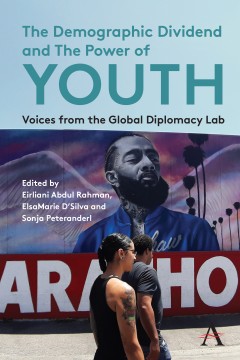The Demographic Dividend and the Power of Youth
Voices from the Global Diplomacy Lab
Edited by Eirliani Abdul Rahman
ElsaMarie D'Silva
Sonja Peteranderl
Other Formats Available:
E-Book- About This Book
- Reviews
- Author Information
- Series
- Table of Contents
- Links
- Podcasts
About This Book
The demographic dividend is the name given by Harvard economists David Bloom and David Canning to the boost in economic growth that can result from changes in a country’s population age structure. As fertility rates decrease, a country’s working-age population grows larger relative to the young dependent population. With more people in the labor force and fewer children to support, a country has a window of opportunity for rapid economic growth if the right social and economic investments and policies are made in health, education, governance, and the economy. Conversely, research shows that resource requirements to support a large population of children and youth can depress the pace of economic growth and prevent needed investments in human capital. The discourse on responding to this population growth frequently excludes the youth. The result can be an apathetic community of young people who withdraw from participation in political and democratic processes.
We have compiled a series of articles that address the issue and highlight solutions from different parts of the world, from members of the Global Diplomacy Lab to external contributors: how they see their work promoting, enhancing and contributing to harvesting the demographic dividend.
What stories can they tell that can educate and inspire readers? In defining “harvesting the demographic dividend”, we want to identify ways to increase inclusion, ownership, sustainability and the impact of democracy and together, foster a shared global understanding of the challenge. The essays in the book are couched in language that is accessible, engaging, informative, entertaining, illuminating and inspiring. The book highlights, in particular, exceptional and inspiring stories that share unique perspectives on how work in one’s field seeks to, can or has promoted, provided and preserved human dignity.
Reviews
“In reviewing this book, I found the author’s use of unconventional case studies with illustrations to convey stories quite interesting. It brings even a layman to the understanding of the importance of youth in relation to the demographic dividend and what can be done to harness it to the benefit of nations and the world at large before it is too late.” — Elizabeth Adekunle, Executive Director, African Women and Youth Organization
“This compilation is of enormous value to researchers, scholars and university libraries. The essays explore topics in an innovative and creative manner. The authors know their subjects and explore them with commitment, often producing exquisitely expressed documentation.” — Melanie Cheary, strategic communications developer for humanitarian programmes
Author website; Global Diplomacy Lab - https://global-diplomacy-lab.org/home/
Author Information
Eirliani A Rahman is an executive director of YAKIN (Youth, Adult survivors & Kin In Need) and works for Nobel Peace Laureate Kailash Satyarthi on issues of child sex trafficking and child labour. She is the author of Survivors, Breaking the Silence on Child Sexual Abuse (2017) and won the 2015 BMW Foundation Responsible Leaders Award.
ElsaMarie D’Silva is founder and CEO of Red Dot Foundation (India) and president of Red Dot Foundation Global (USA). Its platform, Safecity, crowdsources personal experiences of sexual violence and abuse in public spaces.
Sonja Peteranderl is the Latin America correspondent for Der Spiegel in Tijuana, Mexico, and is the founder of BuzzingCities Lab, a think tank focusing on how digitalisation influences security, organised crime and urban violence in megacities.
Series
Table of Contents
List of Illustrations; Foreword by Ambassador HE Dr Michael Schaefer; Notes on Contributors; Introduction by Eirliani Abdul Rahman, ElsaMarie D’Silva and Sonja Peteranderl; Chapter 1 Reaping Morocco’s Demographic Dividend: Lessons from Sub-Saharan Africa, Lynn Houmdi; Chapter 2 Social Media as a Weapon: How the Youth in Rio de Janeiro’s Favelas Fight Police Violence, Julia Jaroschewski; Chapter 3 Mobilising Human Capital to Harness the Demographic Dividend: The Role of the Diaspora as Actors of Change in the Gambia, Kebba- Omar Jagne; Chapter 4 Engaging Youth to Address Sexual Violence in India, ElsaMarie D’Silva; Chapter 5 Putting the African Girl at the Centre of Demographic Change Programmes, Ekua Yankah; Chapter 6 From Incarceration to Transformation: Ex-Gang Members as Actors of Change in Los Angeles 65, Sonja Peteranderl; Chapter 7 African Continental Youth Policy as a Tool for Harnessing the Demographic Dividend, Patrick Mpedzisi and Annegret Warth; Chapter 8 Digital Mindfulness for Indian Millennials, Rudrani Dasgupta; Chapter 9 Lessons from Africa: What Can a Community of Pastoralists Offer the International Cooperation Community?, Elizabeth Maloba and Stefan Cibian; Chapter 10 Revisiting Democracy: Intersectionality, Youth and the Imperative of ‘Climate Justice’ – Sardinia’s ‘Europe Day’, Colette Mazzucelli, Christian Rossi and Viola Prisca Roggia; Acknowledgements; Index.
Links
Stay Updated
Information
Latest Tweets



